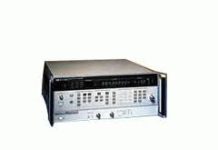SVET Overview
The Scanning Vibrating Electrode Technique uses a single wire to measures voltage drop in solution. This voltage drop is a result of local current at the surface of a sample. Measuring this voltage in solution images the current at the sample surface. Current can be naturally occurring from a corrosion or biological process, or the current can be externally controlled using a galvanostat.
A piezo unit vibrates the probe in Z-direction (axis parallel to the sample). The amplitude of vibration may be only 10s of microns peak-to-peak. This small vibration provides a very small voltage to be measured.
Therefore, the response (signal + noise) at the probe is then gained by the electrometer. The gained output of the electrometer is then input to a Lock-In Amplifier. This, in turn, uses a phase detector along with a Reference at the same frequency of vibration to extract the small AC signal from the entire measured response. The VersaSCAN capitalizes on Ametek’s industry-leading Noise Characteristics of the Signal Recovery 7230 Lock-In Amplifier to provide superior measurement of these small signals.
The voltage recorded and the probe is repositioned. A data map results as voltage versus position are displayed.
A key application of SVET is to study corrosion process of bare metals. These metals could be galvanic couples or these could occur from local non-uniform corrosion events, such as pits or crevices.
Time-lapse experiment series provide the capability to literally watch the corrosion events happen – as different areas passivate and activate.
Additionally, there are many applications and references for the use and results of SVET used in biological systems.
The VersaSCAN SVET integrates the Base with a Signal Recovery Lock-in Amplifier, a piezo-based vibration module, an electrometer and a single wire- based probe. The SVET technique measures voltage-drop in solution. This voltage-drop exists in electrolyte due to local current activity at a sample surface. SVET adds spatial resolution to applications such as non-uniform corrosion events, such as pits, welds and galvanic couples. Additionally, there are biological applications to SVET.
-
Compatible Lock-in Amplifier: Signal Recovery 7230
-
Capable of both single Line Scans and Area Scans
-
Capable of Time-Resolved Imaging when programmed as a sequence
-
Can perform Constant-Distance operation in conjunction with a topographic measurement technique, typically OSP
Specifications
|
Lock-in Amplifier: |
|
|
Noise Sensitivity |
13fA per second |
|
Frequency Range |
1 mHz up to 250 kHz |
|
Full Scale Sensitivity |
from 10nV to 1V |
|
DSP Stability |
Impervious to temperature drift |
|
High Mechanical Stability |
No fan for failure |
|
Piezo: |
up to 30 microns vibration perpendicular to sample surface |
|
Electrometer: |
|
|
Gain |
from 1x to 10,000x in decades |
|
Probes: |
|
|
Material |
Pt/lr |
|
|
Single-element probe |




















